Tommy Tuberville opposes biological males competing in women’s sports
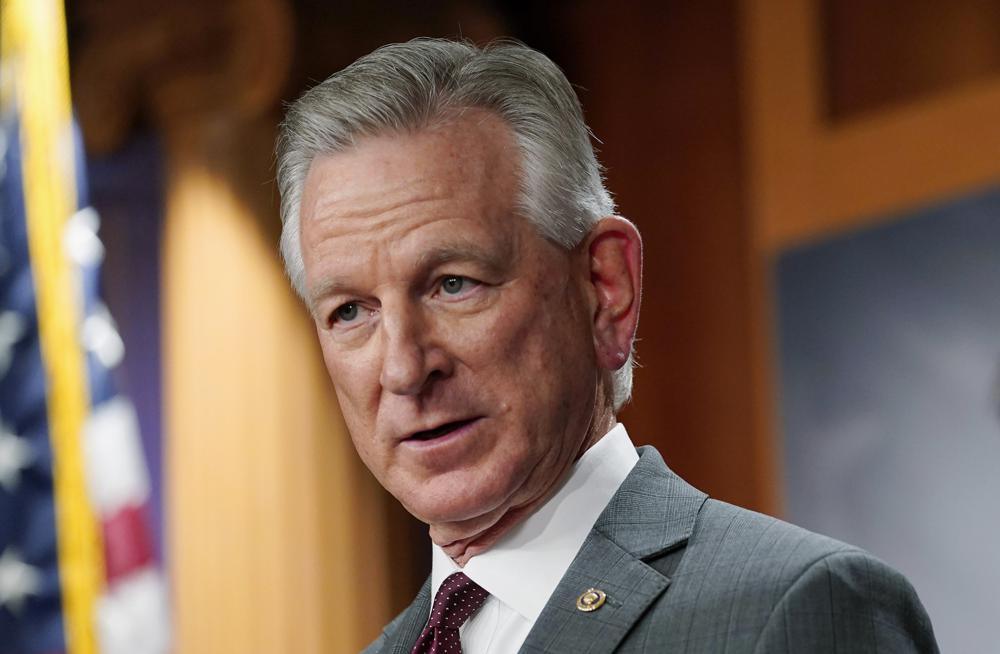
U.S. Senator Tommy Tuberville authored an op-ed in National Review outlining his reintroduction of the Protection of Women and Girls in Sports Act to preserve Title IX protections and keep biological males from competing in female sports. The reintroduction of this legislation comes as the U.S. Department of Education is moving forward to implement new rules in May that would allow biological males to compete in girls’ and women’s sports beginning in the 2023-2024 school year. “50 years ago, we discovered a winning strategy for all of America’s female athletes: Title IX. Signed into law in 1972, the 37 words of this relatively simple legislation empowered women to win by leveling the playing field and providing them access to the same athletic opportunities that their male counterparts enjoyed,” Tuberville wrote. “That level playing field is now under attack by activists who care more about politics than what’s best for female athletes.” “We must protect women’s sports. That is why I reintroduced the Protection of Women and Girls in Sports Act yesterday to push back against the far left’s attempts to destroy women’s sports and preserve the opportunities they have provided female athletes for half a century,” Tuberville explained.” My legislation would require institutions to recognize an athlete’s gender as what it was at birth and stop giving federal funding to any program or institution that allows biological males in women’s sports.” “Last year, on the 50th anniversary of Title IX, the Department of Education proposed a new rule to allow biological males to compete in women’s sports, citing the change as more ‘inclusive.’” Tuberville continued. “I submitted a public comment to the proposed rule change and discussed seeing the positive impacts of Title IX firsthand, four years after its enactment, while coaching girls’ basketball at Hermitage High School in Arkansas. But like those of many other athletes, coaches, educators, and parents, my concerns were ignored by Secretary Miguel Cardona as the Department of Education charged ahead with plans to finalize this change in May.” “There is nothing inclusive about forcing female athletes who train all their lives in hopes of achieving first place to instead compete for second, third, and fourth place because the top spot is invariably taken by athletes who have obvious physical advantages associated with their gender,” Tuberville said. “Biological men have won 28 women’s sports titles since 2003. This number will only increase when the boundaries are completely removed.” Tuberville appeared on Fox and Friends to defend women’s sports. Specifically, the Protection of Women and Girls in Sports Act will: Ensure Title IX provisions treat gender as “recognized based solely on a person’s reproductive biology and genetics at birth.” Ban recipients of federal funding from operating, sponsoring, or facilitating athletic programs that permit a male to participate in a women’s sporting event. The legislation is endorsed by Independent Women’s Voice, Concerned Women for America, and Heritage Action for America. Carrie Lukas is the vice president of Independent Women’s Voice. “More than 50 years ago, Congress enacted Title IX to ensure equal opportunity in all aspects of education, including athletics,” said Lukas. “But without single-sex teams and single-sex competition, equal athletic opportunity is but a farce. Forcing female athletes to compete against biological males is unfair. But it’s also discriminatory. Allowing biological males to take awards, roster spots, scholarships, or spots at a school from female athletes violates Title IX’s prohibition of discrimination ‘on the basis of sex.’ The Protection of Women and Girls in Sports Act will help preserve equal athletic opportunity for both sexes. IWV is thankful for Senator Tuberville’s leadership on this important issue.” Penny Nance is the CEO and President of Concerned Women for America Legislative Action Committee – the largest women’s policy organization. “We have championed the cause of a fair playing field for female athletes for years,” said Nance. “Understanding the importance of sports, Coach Tommy Tuberville has proven to be a leader on the issue. It’s time for Congress to stop injustice and discrimination against female student-athletes in their own sports. Our Young Women for America leaders have experienced the embarrassment of competing against men and are fighting this battle on their college campuses. Passing the Protection of Women and Girls in Sports Act is a top priority. Never again should female athletes lose their trophies, their scholarships, and their dignity to males.” Jessica Anderson, executive director of Heritage Action for America, stated. “By ignoring the biological differences between men and women and forcing women to compete against men in sports, the Left is threatening to limit women’s opportunities on and off the field. The Protection of Women and Girls in Sports Act protects women’s physical safety and scholarship opportunities by making it illegal for a recipient of federal funds who operates, sponsors, or facilitates athletic programs to allow men to participate in women’s athletic teams or programs. Heritage Action supports the passage of this essential legislation and thanks Senator Tuberville for leading the fight in the Senate to protect women’s safety, privacy, and opportunities.” Joining Tuberville as original cosponsors are U.S. Senators Mike Lee (R-Utah), James Lankford (R-Oklahoma), Tom Cotton (R-Arkansas), Marsha Blackburn (R-Tennessee), Roger Marshall, M.D. (R-Kansas), Ted Budd (R-North Carolina), Kevin Cramer (R-North Dakota), Cindy Hyde-Smith (R-Mississippi), Mike Braun (R-Indiana), Rick Scott (R-Florida), Jim Risch (R-Idaho), Mike Crapo (R-Idaho), Bill Hagerty (R-Tennessee), Marco Rubio (R-Florida), Joni Ernst (R-Iowa), Cynthia Lummis (R-Wyoming), Steve Daines (R-Montana), and Josh Hawley (R-Missouri). Tommy Tuberville spent decades as a teacher and coach prior to his election to the Senate in 2020. To connect with the author of this story or to comment, email brandonmreporter@gmail.com.
UAB study explores the link between brain inflammation and Parkinsons

A new research study conducted by the University of Alabama at Birmingham supports the premise that there is a connection between inflammation and Parkinson’s disease early in the disease’s progression. The findings were published online in Movement Disorders. The study found reason to accept the conclusion that central inflammation is observed early in the disease process of Parkinson’s. The study found that inflammation is independent of treatment for the disease and correlates with cognitive features and certain peripheral markers of inflammation. Dr. Talene Yacoubian is a professor in the Department of Neurology at Marnix E. Heersink School of Medicine. “An association between inflammation and Parkinson’s is well known, but a fundamental question remains unanswered,” said Dr. Yacoubian. “Does inflammation play a role in the onset of Parkinson’s, or is it a byproduct of the disease itself? Our findings show that inflammation is present in the early stages of the disease.” Yacoubian’s team studied 58 people newly diagnosed with Parkinson’s disease and compared them with 62 healthy control subjects. “Enrolling study subjects early in their disease progression was significant,” said Yacoubian. “We wanted to see if inflammation was present early on in the disease, before patients had even begun on Parkinson’s medications.” Yacoubian holds the John A. and Ruth R. Jurenko endowed professorship at UAB. The team used PET imaging to target translocator protein, or TSPO, a protein found primarily in microglial cells and other immune cells in the brain. Increased TSPO is associated with inflammation. Yacoubian and colleagues used a radioligand developed in Europe called 18F-DPA-714. Once injected into the bloodstream, this radioactive molecule binds to TSPO, causing it to light up on PET imaging. “We found elevations in TSPO binding in untreated subjects at early stages of Parkinson’s, indicating the presence of inflammation,” Yacoubian said. “Our data clearly demonstrate that increased TSPO binding is present in Parkinson’s independent of treatment effects. Our multimodal study provides further evidence that TSPO signal as measured by 18F-DPA-714 is a marker of inflammation.” Economic developer Dr. Nicole Jones told Alabama Today, “UAB continues to meet the medical needs of residents in central Alabama and is known as a research and development leader. Through R&D, physicians learn more about debilitating diseases, which can help identify potential treatments. Congratulations to UAB on the grant awarded by the National Institute of Neurological Disorders and Stroke/NIH/DHHS to further study Parkinson’s. Your continued pursuit has the opportunity to help shape the lives of Alabamians and the world.” Yacoubian says several key gaps remain as to the role of inflammation in Parkinson’s disease, including the potential effects of Parkinson’s treatments on inflammation, whether or not inflammation changes over time, and whether or not pro-inflammatory signals predict a more rapid progression of the disease. Early symptoms of Parkinson’s can include tremors in hands, slowness and paucity of movement, limb stiffness, and gait and balance problems. Non-motor symptoms of Parkinson’s include depression, anxiety, apathy, hallucinations, constipation, orthostatic hypotension, sleep disorders, loss of sense of smell, and a variety of cognitive impairments. There is no cure for Parkinson’s, but treatments and lifestyle changes can benefit persons diagnosed with the ailment. Pope John Paul II, actor Michael J. Fox, boxer Muhammed Ali, President George H. Bush, evangelist Billy Graham, former presidential candidate Jesse Jackson, and former attorney general Janet Reno are notable people diagnosed with Parkinson’s. To connect with the author of this story or to comment, email brandonmreporter@gmail.com.
Alabama Big 10 Mayors announce their 2023 Legislative agenda
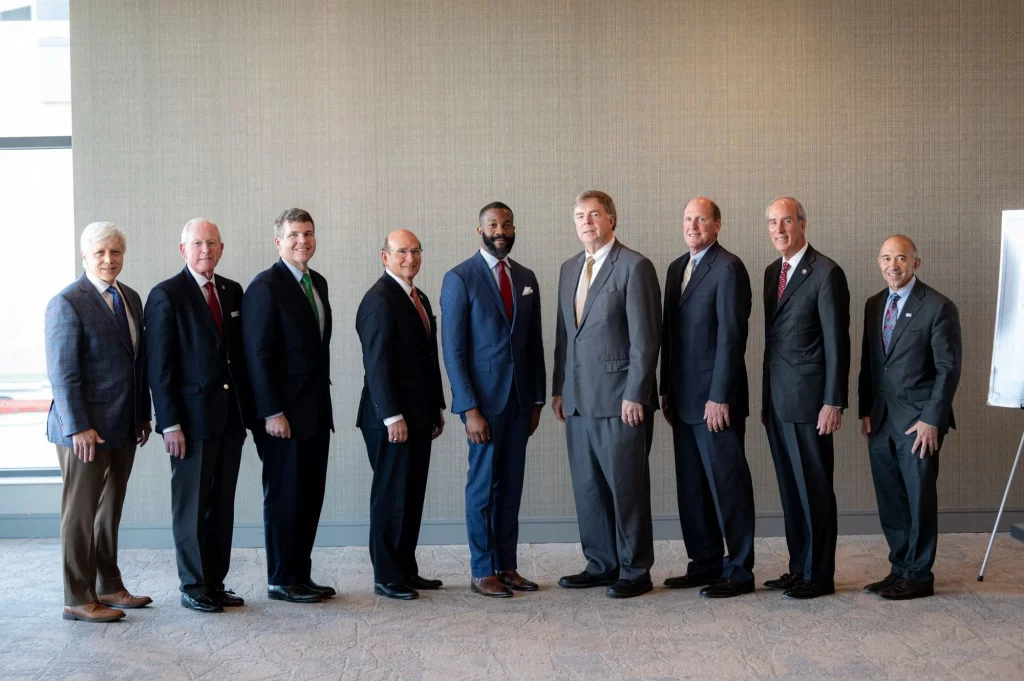
On Friday, the Alabama Big 10 Mayors released their legislative agenda for the 2023 Alabama Regular Legislative session. “Policy decisions made in Montgomery have a direct impact on our cities,” the ten mayors said in a joint statement. “And with nearly three out of four Alabamians living either in or around our state’s ten biggest cities, legislation that creates jobs and improves public safety in our communities benefits the vast majority of Alabamians. That’s why we have joined together to collectively advocate for important, common-sense legislation that will make our state a better place to live, work and raise a family. We look forward to working with our state’s dedicated elected lawmakers to make Alabama a safer, more prosperous state.” The Alabama Big 10 Mayors include Auburn Mayor Ron Anders, Birmingham Mayor Randall Woodfin, Decatur Mayor Tab Bowling, Dothan Mayor Mark Saliba, Hoover Mayor Frank Brocato, Huntsville Mayor Tommy Battle, Madison Mayor Paul Finley, Mobile Mayor Sandy Stimpson, Montgomery Mayor Steven Reed, and Tuscaloosa Mayor Walt Maddox. While 75% of the state’s population lives in the state’s largest metropolitan areas, just 25.1% of Alabamians actually live in the city limits of the ten largest Alabama cities. They range in size from Huntsville at 215,006 down to 56.933 for Madison in the 2020 Census. The mayors listed their key legislative priorities for the Alabama Big 10 Mayors for the 2023 legislative session. These policies, if enacted, will make Alabama a safer, more prosperous state. The Alabama Big 10 Mayors support the reauthorization and accompanying expansion of the Alabama Jobs Act and the Growing Alabama Act. The Mayors claim that the incentive programs established by these bills are critical to keeping Alabama’s economy globally competitive as we work to attract new businesses and new jobs to our communities. The Alabama Big 10 Mayors support efforts to make online sales tax distribution data from the State available publicly. If Alabamians are required to pay taxes on items purchased online, they deserve the right to know where their tax dollars are going. The Alabama Big 10 Mayors support legislation that would make it easier for local governments and land bank authorities to seize vacant, abandoned, and tax-delinquent private properties from landowners and address them in a way that would allow those previously unusable properties to contribute to and improve communities in Alabama cities. The Alabama Big 10 Mayors supports legislation enabling more expedient prosecution of unlicensed persons found to have any “trigger activator“ device, such as a “Glock switch.” These devices are federally illegal and not authorized by gun manufacturers. They effectively turn a semi-automatic firearm into a fully automatic firearm. These devices increase the number of rounds that a handgun can fire per second and decreases the amount of control that the shooter has over the firearm, increasing risks to bystanders and law enforcement. A state law would allow offenders to be prosecuted for having the unapproved device in the state and federal courts. The Alabama Big 10 Mayors support legislation that prohibits and provides criminal penalties for “exhibition driving“ – when a driver purposefully drives intentionally to create unnecessary engine noise, tire skid, burnouts, and other dangerous and dangerous and damaging driving techniques. This is a growing problem across Alabama cities that creates a public safety hazard for pedestrians and other drivers while draining limited law enforcement resources. To connect with the author of this story or to comment, email brandonmreporter@gmail.com.
Katie Britt inspects Texas border with Mexico
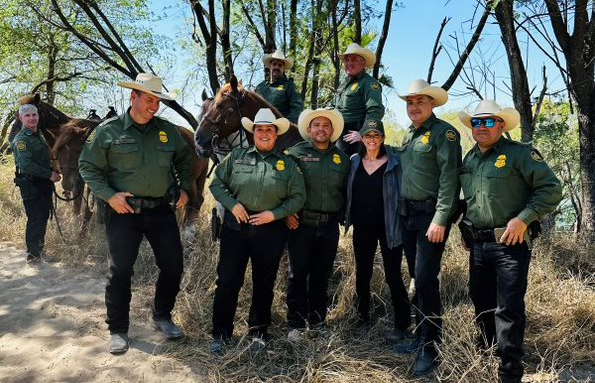
U.S. Senator Katie Britt participated in a press conference with national and local media outlets on Friday from the border at Anzalduas Park in Mission, Texas overlooking the Rio Grande River. Britt said that the trip aimed to learn about the border crisis in order to recommend the best possible solution. “There is an unprecedented national security and humanitarian crisis at our southern border,” said Sen. Britt. “Acknowledging there is a problem is the first step to solving it, but unfortunately, President [Joe] Biden won’t even do that. I am grateful to have this opportunity to see the problem in the Rio Grande Valley firsthand, ask tough questions, listen, and learn – so we can fight for the best possible solutions in the Senate. The number of Americans dying from fentanyl poisoning is equivalent to a commercial airplane going down in our country every single day. Just this week, CBP announced it busted a passenger vehicle that was carrying enough fentanyl to kill every single Alabamian 10 times over. It’s past time for action.” The Senate visit to the border was led by Sen. John Cornyn. “We need help from the Biden administration, but so far, we’ve gotten nothing from them other than open-border policies,” Cornyn said. Britt and the Senators talked with a group of recent border crossers who said they found a 15-year-old who drowned in the River. “The cost of this crisis is real,” Britt said. “When you look at national security, and you look at what’s happening – the hotbed of terrorism in Afghanistan. When you look at what’s going on across the globe, it was startling to hear that in this sector alone, there was an increase of Chinese nationals crossing the border year over year of 488%. Wake up. We must secure this border for the safety of our communities and the strength of them in making sure our children can thrive. As a mama, I look at the fentanyl crisis. I have a seventh-grader and an eighth-grader. This crisis knows no bounds. In the state of Alabama, we have had to use Narcan 15 times since the start of the school year. What I am telling you is that under the failed policies of Biden, every state, including my great state of Alabama, has to become a border state. How many people have to die before enough is enough?” The press conference concluded Senator Britt’s third trip to the border as a U.S. Senator. This trip to the Rio Grande Valley Sector in Texas also included Senators John Thune, Roger Wicker, Deb Fischer, and Pete Ricketts. The senators participated in both night and daytime tours of the border with law enforcement on land and water, visited the Border Patrol’s Ursula Central Processing Center, and met with local law enforcement and landowners to discuss the impact of the Biden Administration’s border policies on local communities. Additionally, the senators received briefings from the National Border Patrol Council, Customs and Border Protection, the Texas Department of Public Safety, and Texas’ new border czar to discuss federal and state efforts to secure our nation’s southern border. In her first two months in office, Senator Britt has also visited the Del Rio Sector of the border in Texas and the San Diego Sector of the border in California. Senator Britt has prioritized border security during her first eight weeks in office. Britt has introduced a robust package of four pieces of legislation and has already cosponsored an additional six bills related to the topic, including Senator Marsha Blackburn’s Stop Taxpayer Funding of Traffickers Act; Senator Chuck Grassley’s Immigration Parole Reform Act of 2023 and Accountability Through Electronic Verification Act; Senator Ted Budd’s Build the Wall Now Act; and Senator Marco Rubio’s No Coyote Cash Act and Felony Murder for Deadly Fentanyl Distribution Act. Senator Britt is the ranking member of the Homeland Security subcommittee of the Senate Committee on Appropriations. She was elected to the Senate in 2022. To connect with the author of this story or to comment, email brandonmreporter@gmail.com.
In Selma, Joe Biden says right to vote remains under assault
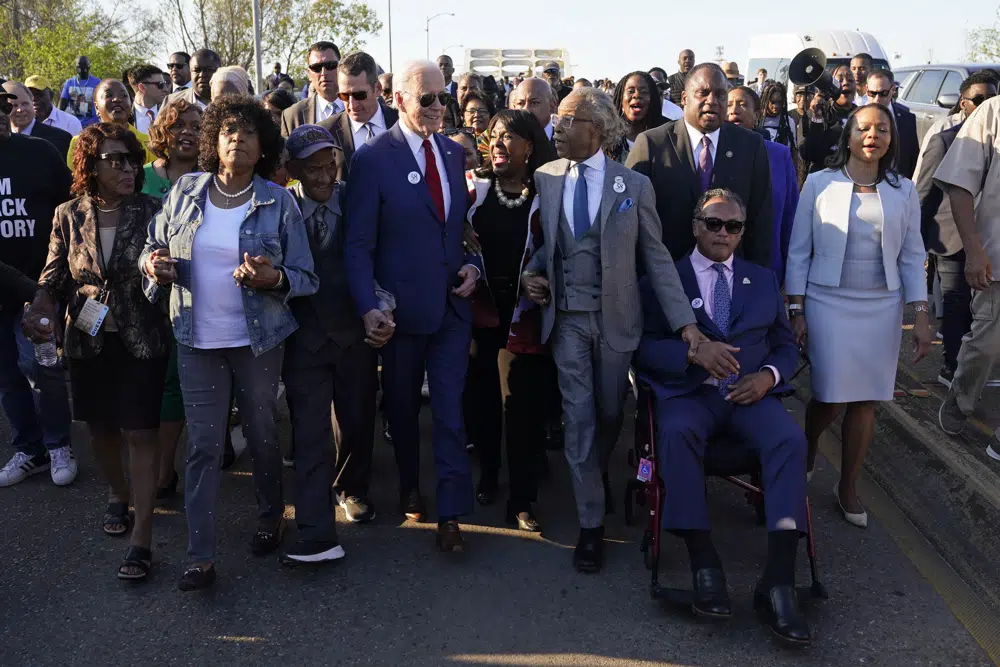
President Joe Biden used the searing memories of Selma’s “Bloody Sunday” to recommit to a cornerstone of democracy, lionizing a seminal moment from the civil rights movement at a time when he has been unable to push enhanced voting protections through Congress, and a conservative Supreme Court has undermined a landmark voting law. “Selma is a reckoning. The right to vote … to have your vote counted is the threshold of democracy and liberty. With it anything’s possible,” Biden told a crowd of several thousand people seated on one side of the historic Edmund Pettus Bridge, named for a reputed Ku Klux Klan leader. “This fundamental right remains under assault. The conservative Supreme Court has gutted the Voting Rights Act over the years. Since the 2020 election, a wave of states and dozens and dozens of anti-voting laws fueled by the ‘Big Lie’ and the election deniers now elected to office,” he said. As a candidate in 2020, Biden promised to pursue sweeping legislation to bolster protection of voting rights. Two years ago, his 2021 legislation, named after civil rights leader John Lewis, the late Georgia congressman, included provisions to restrict partisan gerrymandering of congressional districts, strike down hurdles to voting and bring transparency to a campaign finance system that allows wealthy donors to bankroll political causes anonymously. It passed the then-Democratic-controlled House, but it failed to draw the 60 votes needed to advance in a Senate under control by Biden’s party. With Republicans now running the House, passage of such legislation is highly unlikely. “We know we must get the votes in Congress,” Biden said, but there seems no viable path right now. The visit to Selma was a chance for Biden to speak directly to the current generation of civil rights activists. Many feel let down because of the lack of progress on voting rights, and they are eager to see his administration keep the issue in the spotlight. Few moments have had as lasting importance to the civil rights movement as what happened on March 7, 1965, in Selma and in the weeks that followed. Some 600 peaceful demonstrators led by Lewis and fellow activist Hosea Williams had gathered that day, just weeks after the fatal shooting of a young Black man, Jimmie Lee Jackson, by an Alabama trooper. Lewis and the others were brutally beaten by Alabama troopers and sheriff’s deputies as they tried to cross the Edmund Pettus Bridge at the start of what was supposed to be a 54-mile walk to the state Capitol in Montgomery as part of a larger effort to register Black voters in the South. “On this bridge, blood was given to help redeem the soul of America,” Biden said. The images of the police violence sparked outrage across the country. Days later, civil rights leader Martin Luther King Jr. led what became known as the “Turnaround Tuesday” march, in which marchers approached a wall of police at the bridge and prayed before turning back. President Lyndon B. Johnson introduced the Voting Rights Act of 1965 eight days after “Bloody Sunday,” calling Selma one of those rare moments in American history where “history and fate meet at a single time.” On March 21, King began a third march, under federal protection, that grew by thousands by the time they arrived at the state Capitol. Five months later, Johnson signed the bill into law. This year’s commemoration came as the historic city of roughly 18,000 was still digging out from the aftermath of a January EF-2 tornado that destroyed or damaged thousands of properties in and around Selma. The scars of that storm were still evident Sunday. Blocks from the stage where Biden spoke, houses sat crumbled or without roofs. Orange spray paint marked buildings beyond salvage with instructions to “tear down.” “We remain Selma strong,” Mayor James Perkins said, adding that “we will build back better.” He thanked Biden for approving a disaster declaration that helped the small city with the cost of debris cleanup and removal. ADVERTISEMENT Before Biden’s visit, the Rev. William Barber II, a co-chair of Poor People’s Campaign, and six other activists wrote Biden and members of Congress to express their frustration with the lack of progress on voting rights legislation. They urged Washington politicians visiting Selma not to sully the memories of Lewis and Williams and other civil rights activists with empty platitudes. “We’re saying to President Biden, let’s frame this to America as a moral issue, and let’s show how it effects everybody,” Barber said in an interview. Among those sharing the stage with Biden before the march across the bridge were Barber, the Rev. Jesse Jackson, Martin Luther King III, and the Rev. Al Sharpton. On the bridge crossing, marchers sang “This Little Light of Mine” and “We Shall Overcome,” and, following tradition, once they reached the point where Lewis and others were told in 1958 that they were on an unlawful march, they stopped and prayed. Water bottles were passed out to some who had gathered to hear Biden, and at least one person was taken away on a stretcher because of the upper-70s heat. Some had waited hours in the sun before relief came from shadows cast by nearby buildings. Delores Gresham, 65, a retired healthcare worker from Birmingham, arrived four hours early, grabbing a front-row spot so her grandchildren could hear the president and see the commemoration. “I want them to know what happened here,” she said. In his remarks, Biden said, “Everyone should know the truth of Selma.” And the president took a veiled dig at a high-profile Republican, Florida Gov. Ron DeSantis, when he said: “We should learn everything. The good, the bad, the truth, who we are as a nation.” DeSantis’ administration has blocked a new Advanced Placement course on African American studies from being taught in high schools, saying it violates state law and is historically inaccurate. Last year, he signed legislation that restricts certain race-based conversations and analysis in schools and businesses. More recently, his budget office called on state colleges to submit spending information on programs related to diversity, equity and inclusion, and critical
Restoring rights for felons a rare bipartisan voting change
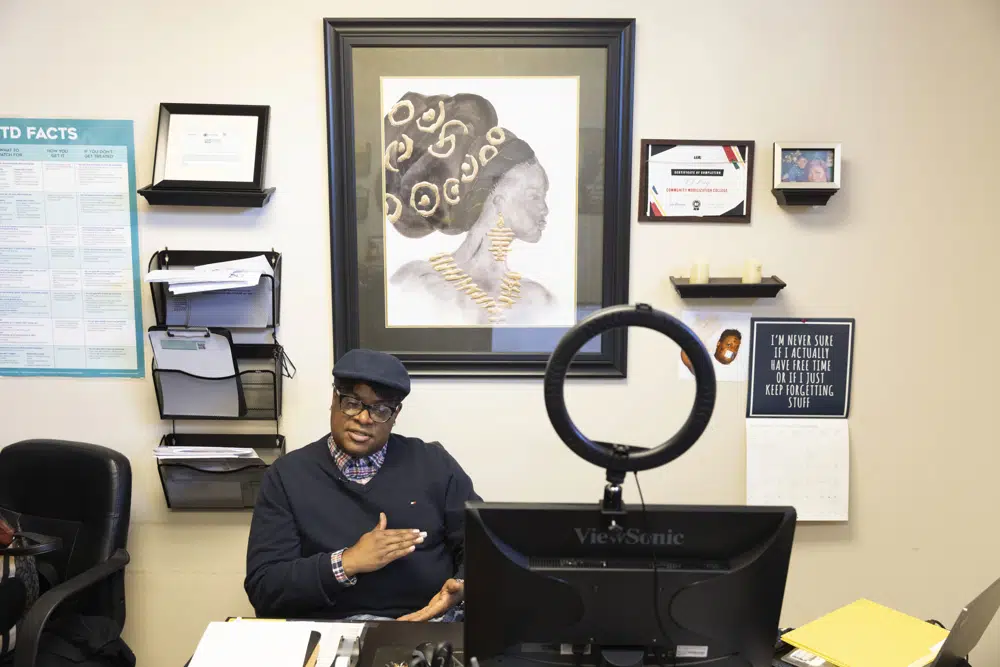
TJ King had candidates and causes to support but couldn’t vote in Nebraska’s last election. An outreach specialist with the Nebraska AIDS Project, King came off probation in August after serving time for drug and theft convictions. In many states, he could have voted in the November general election, but Nebraska requires a two-year wait after the completion of a felony sentence before someone can register. King’s first chance to vote will be in the 2024 presidential election season — unless a legislative proposal introduced in January that would remove the two-year requirement passes and becomes law. That likely would change the timeline for the restoration of voting rights for King and thousands of other Nebraskans. Voting, King said in an interview, gives “a little bit of your strength back and a little bit of your voice back. Being able to vote, being able to have a say in what happens in your society, in your state, is extremely important.” Restoring the voting rights of former felons drew national attention after Florida lawmakers weakened a voter-approved constitutional amendment and after a new election police unit championed by Republican Gov. Ron DeSantis arrested 20 former felons. Several of them said they were confused by the arrests because they had been allowed to register to vote. Attempts like those to discourage ex-felons from voting appear to be an outlier among the states, even as some Republican-led states continue to restrict voting access in other ways. At least 14 states have introduced proposals this year focused on restoration of voting rights, according to the Brennan Center for Justice. An Oregon proposal would allow felons to vote while incarcerated. A Tennessee bill would automatically restore voting rights once a sentence is completed, except for a small group of crimes. Texas legislation would restore voting rights to those on probation or parole. In Minnesota, Democratic Gov. Tim Walz on Friday signed a bill restoring voting rights to convicted felons as soon as they get out of prison. A bill moving through the New Mexico Legislature would do the same. “Restoring voting rights really is an issue where we’ve seen bipartisan momentum,” said Patrick Berry, counsel for the Democracy program at the Brennan Center. More than 4.6 million people are disenfranchised in the United States because of felony convictions, according to the Sentencing Project, which studies the issue and advocates for restoration of voting rights for former felons. Laws vary by state, based on pardon requirements, payment of fines, fees, and child support, and when a sentence (including probation and parole) is considered complete. The impacts fall disproportionately on people of color, especially Black citizens, who account for one-third of the total disenfranchised population while making up about 12% of the overall population. In Nebraska, nearly 18,000 people are unable to vote because of felony convictions, said the Sentencing Project’s director of advocacy, Nicole Porter. That includes 7,072 who fall under the two-year wait requirement and are currently unable to cast a ballot. The rest have not completed their full sentences. Steve Smith of Civic Nebraska, part of a large coalition of groups supporting the measure, said the wait creates a group of taxpayers who can’t choose their representatives. “You’re civically dead, and you can’t vote for the people who are levying those taxes,” he said. The bill that would eliminate the wait would alter a 2005 law. Before then, felonies in Nebraska brought a lifetime voting ban in most cases. At the time, Nebraska was in step with other states. Now, while a few states require wait times for specific offenses or define completion of a sentence as including things such as fines and restitution, Nebraska is alone in requiring a general waiting period beyond imprisonment and release from parole or probation, said Margaret Love, co-founder and director of the Collateral Consequences Resource Center, which keeps a 50-state database on restoration of rights. The bill’s author, Democratic state Sen. Justin Wayne, said he was going door to door in his first election in 2016 and was told by would-be constituents that they could not vote. Much of the reason was confusion over the law’s waiting period, he said. He has introduced bills multiple times to do away with the waiting period, coming close to success in 2017 when a bill passed the Legislature but was vetoed by then-Republican Gov. Pete Ricketts. Wayne, who represents parts of Omaha with strong minority populations, said reconnecting people to the voting process is integral to successful reentry. His bill advanced this past week from a committee to the full Legislature. “When people get out of our system, they’ve got to feel engaged in their community, and the number one way for a person to feel engaged in their community is to be able to vote for the leadership of that community,” he said. Kathy Wilcot, a member of the University of Nebraska Board of Regents, was the lone dissenter from among the nearly 20 witnesses who spoke on Wayne’s bill. Wilcot stressed she was speaking as an individual and not on behalf of the university. “I do think that hopefully, the waiting period reinforces the fact that voting is something very special, and hopefully that will be part of the things that an individual would consider if they’re tempted to break the law again,” she said. Three of the witnesses with criminal records who spoke in favor of the legislation said in later interviews the waiting period is not a deterrent to future crime but rather a barrier for those who have served their sentences. King, 51, fought addiction for years and spent five years in prison after being convicted of possessing the party drug Ecstasy and theft by deception, ending probation last August. King works in the HIV/AIDS field and volunteers at various organizations, but said voting is still the most direct way to be involved and became tearful when talking about being unable to vote. “I felt so hopeless and helpless not being able to have my voice heard in this last election,” King said. “There

